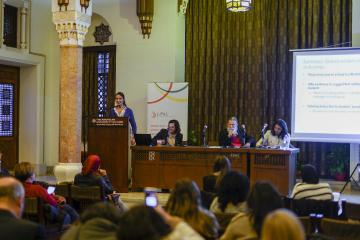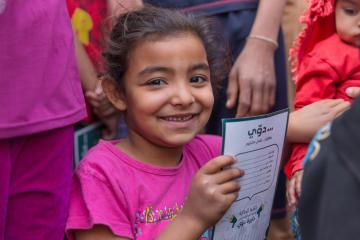
Promoting healthy behaviors and family planning in Egypt: A recap from the Global Evidence for Egypt Spotlight Seminar

Since the 2000s, Egypt has seen rapid population growth. High population growth and limited access to family planning resources can have an adverse impact on maternal and child health outcomes, as well as educational and economic opportunities. Promoting family planning is thus integral to facilitating human development, and ultimately reducing poverty in Egypt.
J-PAL Middle East and North Africa (J-PAL MENA) at The American University in Cairo (AUC) co-hosted a seminar with UNICEF Egypt on February 22, 2022 to share global evidence on family planning to promote healthy behaviors in Egypt. This seminar was the fifth in a broader Global Evidence for Egypt Spotlight Seminar Series that aims to foster a discussion between Egyptian policymakers, development practitioners, and J-PAL affiliated researchers using rigorous evidence relevant to timely policy priorities.
The seminar featured Dr. Caroline Krafft, J-PAL MENA Invited Researcher and Associate Professor in the Department of Economics and Political Science at St. Catherine University; Dr. Tarek Tawfik, Deputy Minister of Health and Population for Population; Frederika Meijer, UNFPA Representative in Egypt; Dina Heikal, Social and Behavioral Change Officer at UNICEF Egypt; Dr. Fazlul Haque, Deputy Representative of UNICEF Egypt; and was moderated by Alison Fahey, Executive Director of J-PAL MENA at AUC.
Dr. Krafft opened the panel with an overview of global evidence focused on improving women’s access to family planning. Dr. Tawfik followed with an overview of national efforts to promote family planning and a perspective on persisting challenges. Ms. Meijer then discussed UNFPA’s efforts to support national policies and programs to ensure widespread access to reproductive health services and to improve maternal and child health outcomes. Ms. Heikal concluded with insights on addressing gender norms and empowering girls, women, and families as a way to address desired fertility and family planning decisions, focusing on social and behavioral change dimensions.
Ongoing efforts to improve family planning in Egypt
The Government of Egypt is working with donors and implementers to roll out programs that aim to to raise awareness and increase access to family planning services across Egyptian governorates.
In his remarks, Dr. Tawfik highlighted that the family planning sector at the Ministry of Health and Population (MoHP) is working to increase the prevalence of contraceptive use in Egypt. MoHP is using mobile units to reach remote areas and providing capacity building and counseling to health care providers to improve the quality of available services across Egyptian governorates. The MoHP is also increasing the number of female physicians in Upper Egypt to overcome stigma and better reach girls and women in governorates with high levels of poverty.
Dr. Tawfik highlighted the Ministry of Planning and Economic Development’s newly launched National Family Development Program and its plans to target women aged 20 to 45 with free distribution of contraceptives, economic empowerment efforts, and financial incentives, with efforts to customize interventions to local and district needs. The program also includes launching mass media campaigns to raise population awareness about family planning as well as the adverse effects of population growth.
Similarly, UNFPA works to fulfill demand side and supply side needs related to addressing family planning in Egypt through multiple programs, including the Your Right to Plan Campaign launched in collaboration with the MoHP. With a mission to promote rights-based family planning, the campaign provides contraceptives, improves access to reproductive health services, and engages in awareness messaging. UNFPA is also working to expand women’s choices, integrate reproductive health messaging in education, and address social norms in collaboration with faith-based organizations and community leaders.
Recognizing the importance of creating enabling environments for girls and improving women’s agency, UNICEF and UNFPA are working together to target girls aged 12 to 13 to reduce dropout rates in schools and equip adolescents with life skills to expand their opportunities beyond marriage and help them transition into the labor force. Overall, panelists agreed that multiple dimensions feed into women’s family planning preferences, emphasizing the need for cross-sectoral interventions that address background and proximate determinants of fertility in Egypt.
Dr. Krafft’s five lessons on family planning
Evidence from randomized evaluations conducted by J-PAL affiliated professors globally in low- and middle-income countries suggests that family planning services may have a positive impact on economic and social outcomes as well as poverty reduction. Dr. Krafft shared her five key takeaways from rigorous global research on the links between family planning services and economic and social outcomes:
i. Increasing educational and economic opportunities for girls and young women may reduce early childbearing
Researchers in Kenya found that reducing school costs through education subsidies helped girls stay in school and in turn delayed childbearing among adolescents. In India and the Dominican Republic, researchers found that programs which strengthen beliefs about girls’ and young women’s abilities and future economic opportunities can encourage them to delay childbearing and reduce desired fertility. In contexts where parents and others influence childbearing outcomes, Dr. Krafft noted that programs should also consider involving these decision-makers.
ii. Awareness messaging can help shift attitudes towards family planning and childbearing
In Zambia, researchers found that providing information to men on risks of maternal mortality can increase male acceptance of family planning, as husbands who received the information had lower fertility preferences than husbands who did not and reported more accurate knowledge of their wives’ fertility preferences. Similarly in Burkina Faso, a mass media campaign corrected misinformation, changed beliefs, and improved attitudes about family planning. Dr. Krafft suggested that this research indicates the media can be a powerful tool to encourage behavioral change.
iii. Providing women with private access to family planning services may lead to increased take-up
In contexts in which women have less bargaining power, providing private access to contraceptives may be an effective means of enabling women to achieve their fertility goals. In Zambia, researchers found that women who received private access to vouchers for contraceptives without their husbands were more likely to take up and use contraception. Dr. Krafft pointed out that this implies that private access to contraception can enable women to make family planning decisions that they otherwise might not be able to make.
iv. More evidence is needed on whether tailoring programs to consumers’ preferences can lead to increased contraceptive take-up
Researchers found that linking microcredit and family planning programs together did not increase contraceptive use and was ineffective at changing reproductive behavior and preferences in Ethiopia, possibly due to a discrepancy between methods offered in the program and consumers’ preferences. Similarly in Jordan, researchers did not detect significant impacts of an evidence-based medicine program on changing family planning providers’ biases against injectable contraceptives. Dr. Krafft noted that this highlights the potential need to add a component addressing consumers’ misconceptions and biases as well as health care providers’ biases to related interventions.
v. Providing targeted training to health care providers may be effective in improving family planning service delivery
In Nigeria, researchers found that training targeted to health care providers increased the quantity of contraceptive methods offered and the quality of family counseling provided at private health care facilities. However, the program had no impact on the range of methods covered, technical competence, or continuity. Dr. Krafft highlighted that this may indicate that important issues still lacked coverage in counseling sessions.
This evidence has the potential to inform policy decisions around addressing demand for family planning resources in Egypt, although evaluating national family planning programs is crucial to generating research that further grounds lessons on what approaches are most effective in the Egyptian context.
J-PAL MENA at AUC will continue to engage policymakers, development practitioners, and J-PAL affiliates in discussions on priority issues and development challenges in Egypt as part of its Global Evidence for Egypt Spotlight Seminar Series with UNICEF Egypt. Register for email updates and follow J-PAL MENA’s accounts on Twitter, Facebook, and LinkedIn to find out about future events and seminars.
Related Content

Strengthening the Egyptian education system: A recap from the Global Evidence for Egypt spotlight seminar on education

Shifting social and gender norms for improved development outcomes: A recap from the Global Evidence for Egypt Spotlight Webinar



